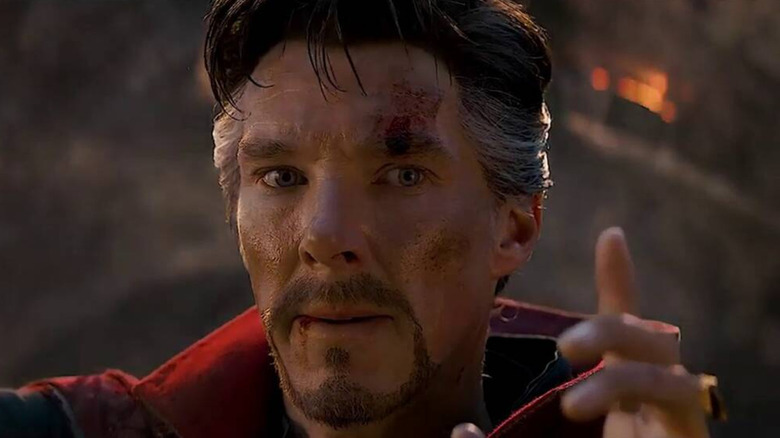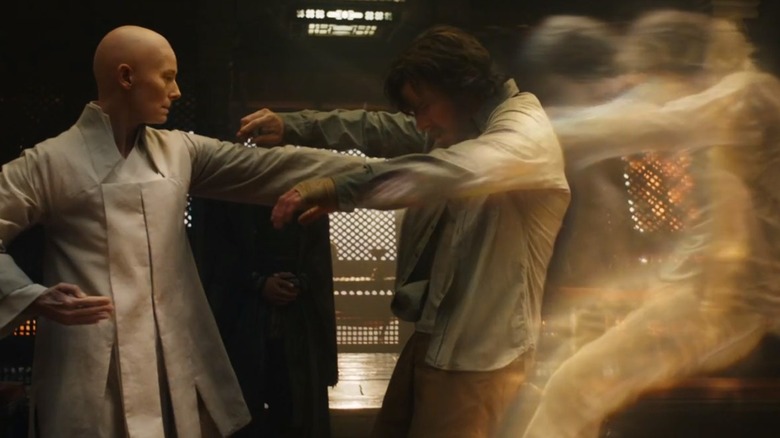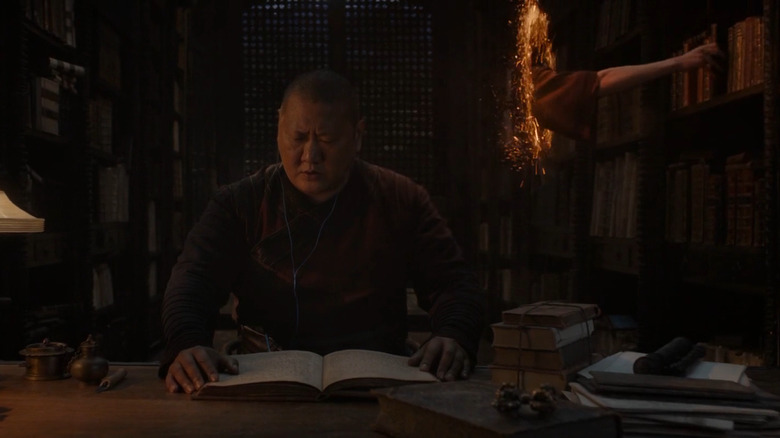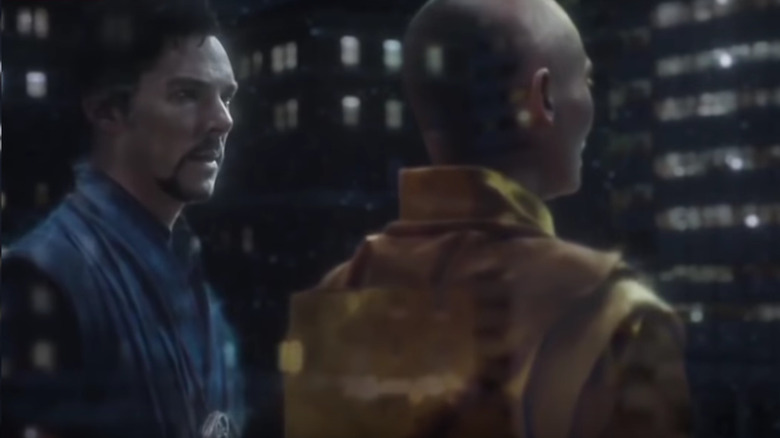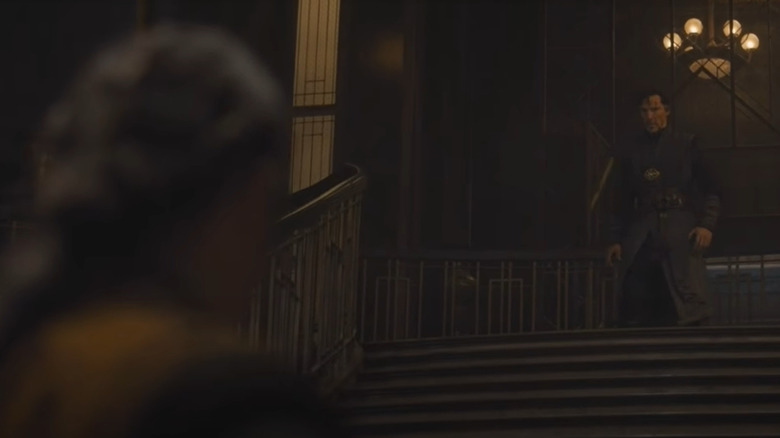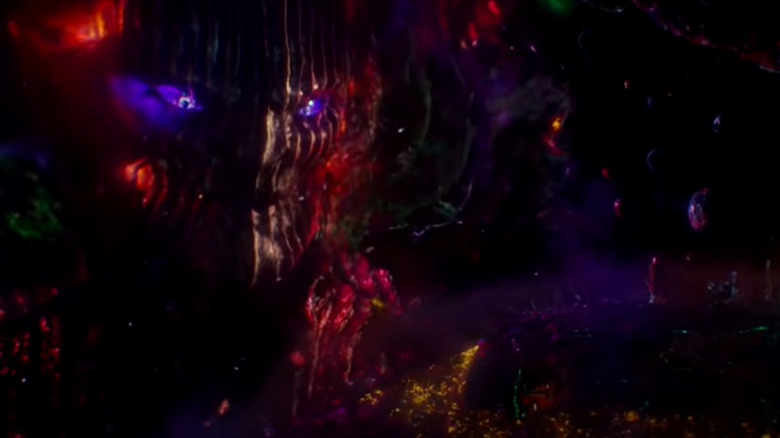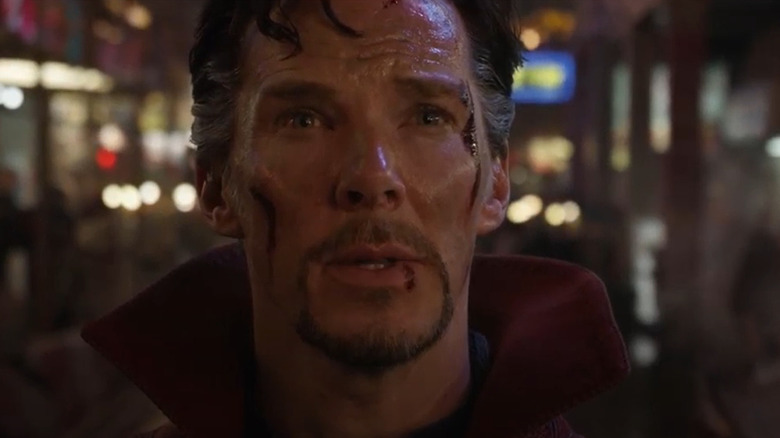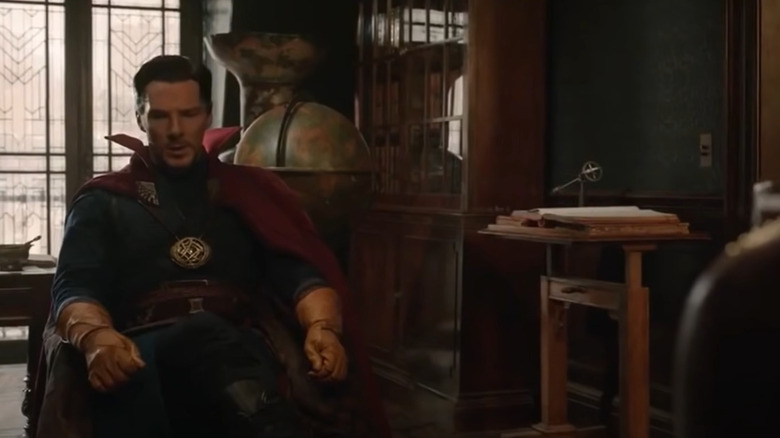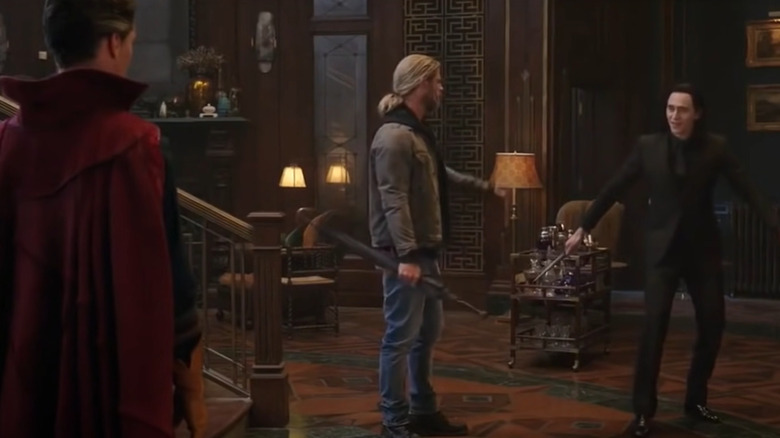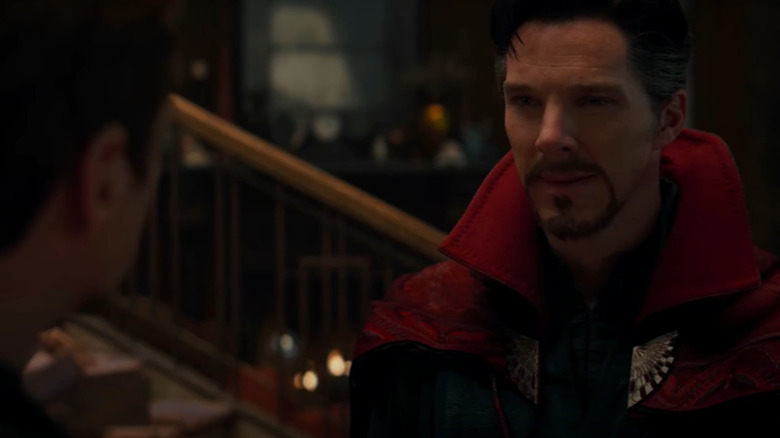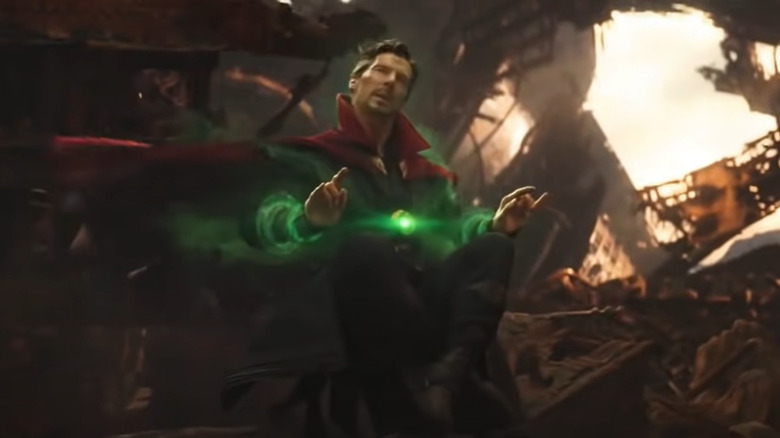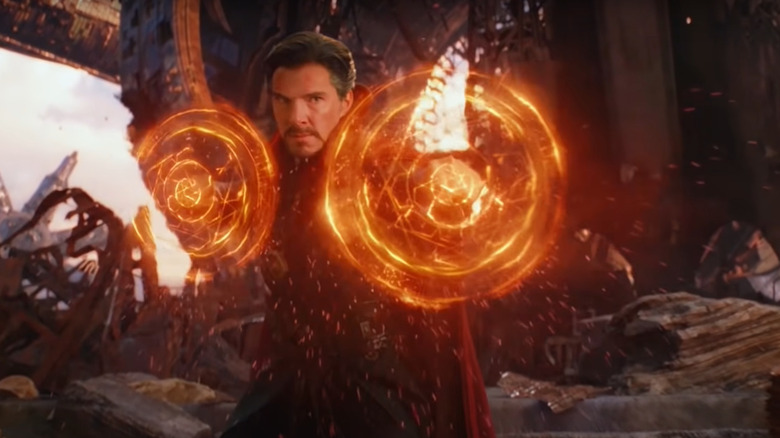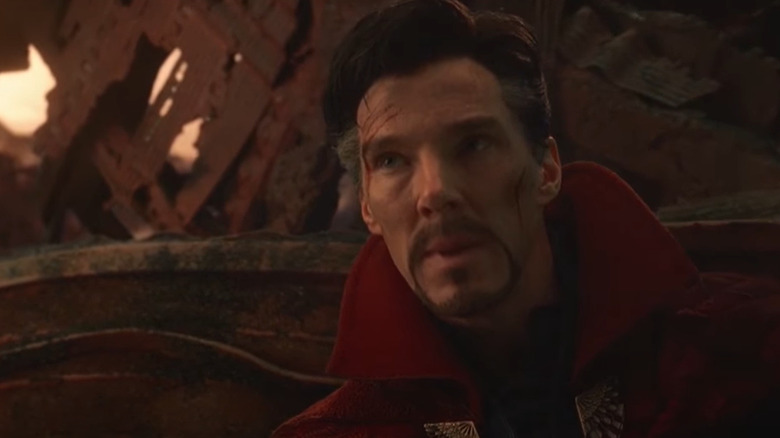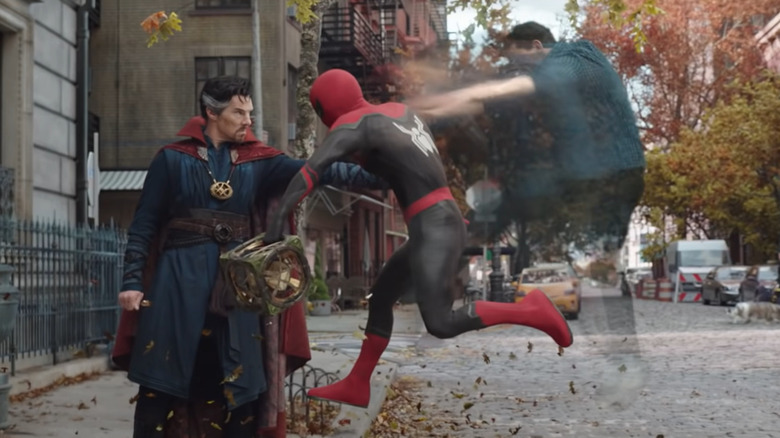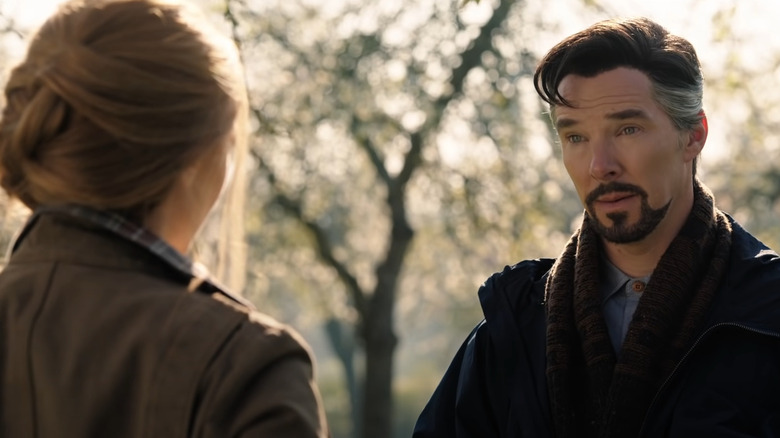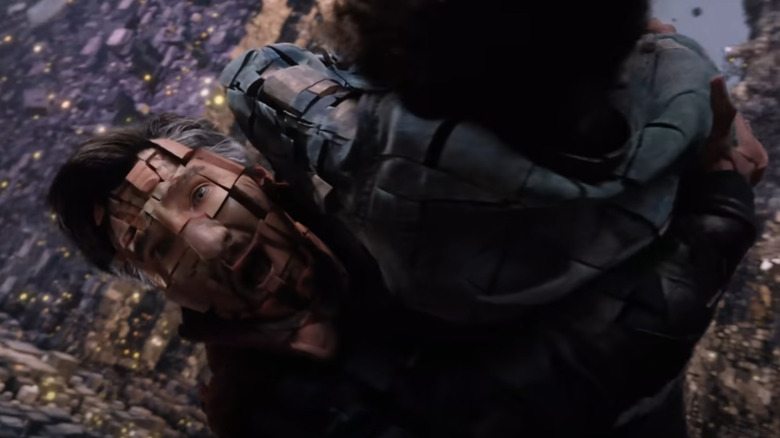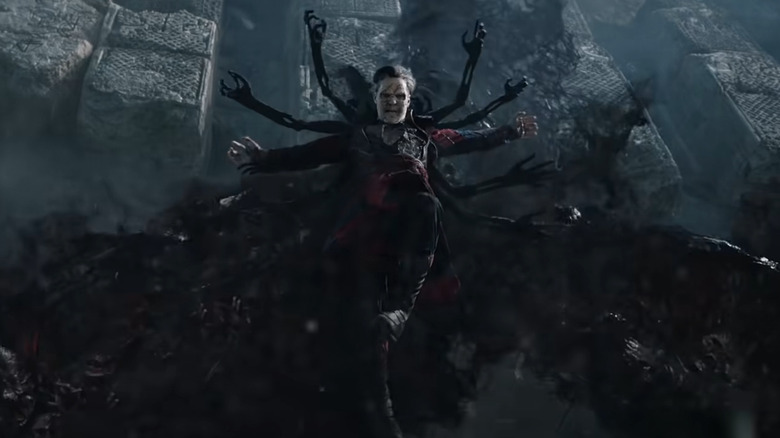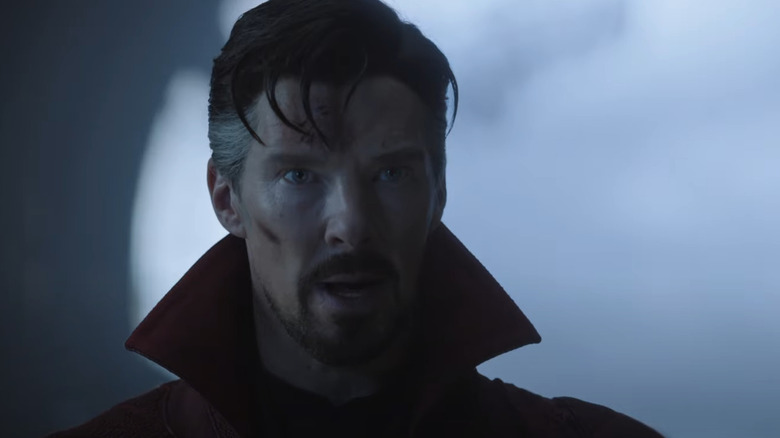Most Memorable Doctor Strange Quotes In The MCU
By the time the first "Doctor Strange" movie came out in 2016, the Marvel Cinematic Universe (MCU) had already been firing on all cylinders for close to a decade. But his late entry did not make Benedict Cumberbatch's turn as Doctor Stephen Strange, the Master of the Mystic Arts, any less of a game changer.
Doctor Strange has since become one of the most important players in the cinematic universe, most recently seeming to fill the void left open after the departures of leadership-minded heroes Tony Stark and Steve Rogers. The good doctor has become someone other superheroes look to in times of crisis, thanks to his vast knowledge of magic, sharp mind as a onetime accomplished surgeon, and a natural (if, like Stark, occasionally bordering on narcissistic) air of authority.
He has also become something of a font of wisdom. No matter how you feel about the character, it's difficult to deny that his words have helped shape the direction of the MCU — and now, with its newfound reliance on the multiverse, that seems likely to increase. Here are some of the most memorable, magical quotes uttered by the Master of the Mystic Arts.
Teach me.
Before finding a second life as the Sorcerer Supreme, Stephen Vincent Strange M.D., Ph.D was one of the most talented neurosurgeons in the world. Unfortunately, he was also fully aware of his exceptional skills, allowing his talents to bring him to the point of repugnant arrogance.
It all came back to bite him when Stephen suffered an accident that severely damaged his nerves, robbing him of his livelihood. At first he was convinced he could find a cure for his condition through medical science. When that did not work, Stephen's last-ditch option was to travel to Kamar-Taj to seek help from the Ancient One (Tilda Swinton).
Stephen's arrogance almost cost him that chance as well, since he refused to believe the Ancient One knew actual magic. After the latter proved to him beyond a doubt that magic is real, Stephen's entire worldview exploded. He finally set his arrogance aside and implored the Ancient One with this two word declaration. That was the first step in the former doctor's journey towards becoming the Master of the Mystic Arts, and what a journey it has been in the years since.
Wong. Just Wong?
While Doctor Strange has oftentimes been a haughty, arrogant person who does not suffer fools easily, he does have a sense of humor. No one brings out this lighthearted side of Strange like his fellow sorcerer Wong (Benedict Wong). The two first met when Wong was the keeper of the sacred library at Kamar-Taj.
Back then, Stephen was still a newbie in the world of magic. A student by nature, he came to the library to get his journey as a sorcerer underway as soon as possible. That was when Stephen first met the librarian, who introduced himself as Wong. "Wong. Just Wong?" Stephen asked. "Like Adele? Or Aristotle. Drake. Bono ... Eminem."
Stephen's attempts at humor did not seem to please Wong, who remained stone-faced while the former tried to think of more one-named celebs. But despite not laughing, Wong seemed to feel a measure of kinship towards Stephen, since he gave him plenty of books about magic to read — and was clearly impressed by the man's abilities to devour such learning texts. Later on, the two would become good friends and partners-in-crime, and Stephen would discover that Wong also has a sense of humor — it just takes a while for someone to uncover it beneath his hardened exterior.
I'm not ready.
Doctor Strange's first solo movie was as much about him learning humility through uncovering his limits as it was about him learning magic. Before coming to Kamar-Taj, Stephen had always been fully confident in who he was as a person, and of his place in the world.
But after becoming an apprentice under the Ancient One, Stephen's mind was opened to worlds he had never known existed. He became aware of vast oceans of forces and energies and other planes of existence that made his former life feel like an insignificant drop of water in comparison. To top it all, Stephen was informed that not only was he supposed to learn about the world of magic, but then employ that knowledge to defend his realm of existence.
It was that last part that gave Stephen pause. He had never been a fighter, and could not comprehend entering into battle against such powerful forces. That is why, when the Ancient One passed on the mantle of the Sorcerer Supreme to him, Strange's response was a desperate, "I'm not ready." As later events would prove, Stephen was indeed the person most suited to the role — and undoubtedly, the Ancient One knew that.
It's Strange.
If Stephen Strange was the sorcerer's apprentice who wanted nothing to do with the chaotic, dangerous side of magic, Kaecilius (Mads Mikkelsen) was the apprentice who embraced it all too whole-heartedly. Kaecilius's whole thing was he wanted to bring a monstrously powerful entity named Dormammu from its realm to ours to make everything one with itself.
With their opposing views on magic and its use thereof, Strange and Kaecilius were two forward-bounding steam trains on the same track, headed for an epic showdown. Yet their first meeting, instead of being epic, was downright hilarious. The two met initially when Kaecilius and his crew of renegade sorcerers invaded one of Kamar-Taj's sanctums where Strange also happened to be present.
After detecting his presence, Kaecilius referred to Stephen as "Mr...?," to which Stephen corrected him with "Doctor." A slightly confused Kaecilius then called him, "Mr. Doctor." When Stephen tried to correct him again with, "It's Strange," Kaecilius replied with, "Maybe. Who am I to judge?" It wasn't the first time Stephen's full name threw someone off in the MCU, but it was perhaps the funniest example of it.
Dormammu, I've come to bargain!
MCU movies have sometimes been accused of following set formulas, particularly when it comes to origin movies. You have the wisecracking hero who discovers a new source of power. You have the villain, who is like the hero in many ways but evil, and you have the big battle at the end where most of the heavy lifting is done by CGI instead of actors.
"Doctor Strange" ticks the first two boxes on the list, but it manages to do something quite unique for its grand finale. Strange arrives in another dimension to confront Dormammu, an eldritch abomination that seeks to take over our dimension and absorb everything in existence. Since Strange has no chance of beating Dormammu one-on-one, he resorts to trickery using time magic.
With the now-iconic line "Dormammu, I've come to bargain," Strange keeps approaching the otherworldly demon. Every time Dormammu kills Strange, the two go back in time a few minutes and begin the whole scene again. In the end, Dormammu grows frustrated at being trapped in the time loop, and finally relents, agreeing to leave Earth alone if Strange releases him. With that, the good doctor proves his most formidable weapon isn't sorcery skills, but his mind.
The warnings come after the spells.
"Doctor Strange" ended with the Sorcerer Supreme beating Dormammu in a battle of wits. As a result, the eldritch deity agrees to leave Earth alone, at least for now, and return to his own dimension. One person unhappy with the development is Kaecilius, the renegade sorcerer.
Kaecilius had lost his wife and child earlier in life. Filled with grief, he arrived at Kamar-Taj seeking to understand the meaning of life. Despite years of training to become a sorcerer under the Ancient One, Kaecilius eventually grew disillusioned with her teachings. He concluded that the only way to escape the curse of dying was to steal the pages of a sacred book, use it to summon Dormammu to their dimension, and let him absorb everyone and everything into one eternal being.
When Dormammu was defeated by Strange and agreed to return to his dimension, he took with him Kaecilius and his followers. They were to become one with Dormammu for eternity, but suffer unending torment as a result. When Kaecilius realizes his mistake and desperately tries to escape, Strange remarks dryly, "You really should steal the whole book because the warnings come after the spells."
I keep a watch list.
While Doctor Strange had an entertaining adventure in his own solo movie, his true significance for the MCU was revealed in the places he popped up in other heroes' movies. Case in point, "Thor: Ragnarok," which begins with the God of Thunder meeting Strange in his sanctum.
At first Thor (Chris Hemsworth) does not take Strange too seriously, dismissing him as an ordinary wizard. But it soon becomes clear that Strange is too powerful and knows too much to be taken for granted. Strange takes command of the situation, and at the same time stakes a claim over Earth when he tells Thor, "I keep a watch list of individuals and beings from other realms that may be a threat to this world."
With that line, Strange makes it clear that the Avengers are not the only superheroes watching over the planet any more, and any future malcontent threatening humanity will have to contend with the Master of the Mystic Arts. Even Thor acknowledges Strange's authority when he asks for help with Loki (Tom Hiddleston) and finding their father Odin (Anthony Hopkins).
All right, bye-bye.
Before Doctor Strange came on to the scene, the most powerful magician in the MCU was generally understood to be Loki. As the God of Mischief, Loki had a whole bunch of enchantments at his beck and call that he frequently employed to take down not just ordinary humans, but fellows gods like Thor and Odin as well.
That was why meeting Strange was a humiliating experience for Loki. The Sorcerer Supreme considered the God of Mischief a threat to Earth, what with the whole "attempting to take over the planet with the Chitauri army" angle that Loki tried to play in 2012's "The Avengers." Before entrusting Loki in Thor's safekeeping, he wanted to first have a chat with the God of Thunder.
To give himself time to talk with Thor, he sent Loki falling through a blank expanse for thirty minutes. When Strange did bring the thoroughly incensed Loki back, he did not seem even slightly bothered by his anger. When Loki tried to attack Strange, the latter sent him and Thor packing with a simple gesture, and the words, "All right, bye-bye." Way to establish dominance over gods, Doctor.
Protecting your reality, douchebag.
Of all the superhero meetups that fans were looking forward to in 2018's super-combo offer "Avengers: Infinity War," few were as highly anticipated as a meeting between Doctor Strange and Tony Stark (Robert Downey Jr.). Both heroes were known for being rich, quick-witted jerks with hearts of gold who could banter with the best of them.
Sure enough, some of the best character moments in the movie occurred between Tony and Strange. Both were determined not to give an ounce of control to the other, and engaged in some childish sniping at each other's expense as a way to establish dominance. Tony got in a good salvo when he asked Strange what his main job was, suggesting it was to make balloon animals for children's parties.
Strange's lip curled in annoyance for a moment, but then he came back with the equally snappy line, "Protecting your reality, douchebag." It was clear that this was one person Tony would not be able to intimidate on the strength of his wealth or his status as Iron Man. Fortunately, the two were able to put their differences aside and work together when the forces of Thanos came knocking on Earth's door.
I went forward in time, to view alternate futures.
When Strange took on Dormammu using a time loop, it was a major highlight for the character in the MCU. But "Avengers: Infinity War" gave him a moment somehow even more memorable.
After taking control of their enemy's ship, Strange arrived on the planet Titan, along with Tony Stark and a few other heroes. There they waited for the arrival of the Mad Titan. While waiting, Strange went into a deep trance. When Tony asked him if he was all right, Strange explained his strategy. "I went forward in time," he revealed. "To view alternate futures. To see all the possible outcomes of the coming conflict." As it turns out, Strange had witnessed more than 14 million possible outcomes of their fight against Thanos that day — and only saw one instance where they won.
From that point on, every move made by Strange was designed to turn that sole outcome where the Avengers win into a reality. During the darkest moments after "The Snap," the assumption that things were following Strange's blueprint (which he insisted he could not divulge, lest it not occur) were all that kept Marvel fans from deepest despair, as they eagerly awaited "Endgame" to provide a resolution.
I think you will find our will equal to yours.
Despite the movie being filled to bursting with major superheroes, the character that stole the show in "Avengers: Infinity War" was the Mad Titan Thanos. Josh Brolin imbued the CGI alien with such heartfelt sincerity and indomitable willpower that you could not help but respect Thanos, even as he plotted to destroy half the universe.
One of the best scenes with Thanos takes place during his first confrontation with Doctor Strange. On the planet Titan, Strange waits, seemingly alone, for Thanos to show himself. When the villain finally appears, he does not try to attack Strange at first, despite knowing the latter is responsible for the death of his loyal soldier Ebony Maw.
Instead, Thanos calmly lays out his plan for the infinity gems, and his reasons for wanting to destroy half of all life. There is no joy in Thanos' voice while he explains his plans, only a weary determination that threatens to overwhelm any show of power. But Strange makes a good case for those standing in opposition to Thanos when he declares: "I think you will find our will equal to yours."
Tony, it was the only way.
Even since the two first met, Doctor Strange and Tony Stark found themselves at odds. They disagreed over strategy, over the extent of the threat to Earth, and even whether or not they should sacrifice a few heroes to save the rest of the universe. By the time they arrived on the planet Titan, the two had come to an uneasy understanding.
Strange had already made it clear to Tony that he was willing to let him and the other heroes die if it meant keeping the time stone safe from Thanos. So when Thanos attacked Strange and the other heroes, and stabbed Tony through his heart, it was clear to the latter that his life was at an end. But then Strange played his ultimate gambit, giving Thanos the stone in return for sparing Tony's life.
As Tony watched in horror, the Mad Titan added one more infinity gem to his gauntlet and went off to Earth to find the rest. When the heroes marooned on Titan began to dust away one by one, Tony knew the worst had happened. As Strange disappeared, all he could say was: "Tony, it was the only way." Tony had to live with those words for the next five years, until Strange's risky move finally paid off in 2019's "Avengers: Endgame."
The multiverse is a concept about which we know frighteningly little.
Even though Strange and the rest of the MCU heroes managed to bring back the part of the universe's population that was dusted by Thanos, the franchise is already laying the groundwork for its next big calamity. An infinite number of them. It all has to do with a word increasingly teased in various MCU properties: Multiverse.
The multiverse is an infinite number of universes that all exist in the same space but within different dimensions. This allows characters from one dimension to hop into another one. That was at the center of 2021's "Spider-Man: No Way Home," when a spell Doctor Strange created for Peter Parker (Tom Holland) destabilized the fabric of reality.
With major villains from other universes dropping into the MCU, Strange makes the ominous proclamation, "The multiverse is a concept about which we know frighteningly little." The inference is clear. While Spidey might be able to clean up this particular mess with the help of Strange, the true threat from the multiverse remains as ominous as a ticking time bomb.
I'm not here to talk about Westview.
After Doctor Strange and Wong save America Chavez from the multi-tentacled terror of Gargantos, the reality-hopping traveler sits down with the two powerful magic users to explain how she found herself in her current predicament. She also shows them the corpse of Doctor Strange's variant, Defender Strange, whom she brought with her to the main MCU Earth, which is later revealed to be designated as Earth-616. Upon inspecting the body of the deceased variant and putting together the pieces of the puzzle, Doctor Strange and Wong conclude that their nemesis uses witchcraft, leading them to turn to the one ally they know who is a master of it: Wanda Maximoff.
Doctor Strange pays a visit to Wanda, who is living a life of solitude after the events of "WandaVision." Upon seeing Doctor Strange, Wanda instantly assumes that her day of reckoning has come and openly admits to the Master of the Mystic Arts that she made terrible mistakes. However, Doctor Strange cuts to the chase, telling Wanda that he didn't come to her to discuss what happened in Westview and is instead seeking her out to deal with the situation at hand.
This line is memorable because it not only acknowledges that the former Sorcerer Supreme is aware of what Wanda has done but also establishes that Doctor Strange cares enough about his colleague that he's willing to ignore her sins while letting her deal with her pain at her own pace.
If your moms are anything like their daughter, they survived.
After barely escaping the clutches of Wanda, who has fully become the Scarlet Witch due to the Darkhold's corrupting influence, Doctor Strange and America Chavez fall through a series of alternate universes before crash-landing on Earth-838. As they make their way through this unfamiliar reality — where America Chavez teaches the Master of the Mystic Arts a couple of essential things to remember about multiversal travel — the pair encounter a memory projection machine that reveals their most significant memories.
This sequence also serves as an origin recap of sorts for America, as it shows how the first manifestation of her reality-hopping powers led to the disappearance of her parents. As a crestfallen America quickly walks away from the machine, Doctor Strange scrambles to find the right words to say to comfort her. He ends up reassuring her that her two mothers likely survived being thrown into another reality, basing his assessment on America's own strength of character.
For a character as selfish and arrogant as Doctor Strange — traits he retains to a certain extent even after he learns how to harness the Mystic Arts — coming up with such a powerful statement to comfort a grieving child shows a surprising level of empathy. This line also helps America realize that among all the versions of Doctor Strange she has encountered across the Multiverse, the one from Earth-616 is decidedly different.
This time, it's gonna take more than killing me to kill me.
Even though the Scarlet Witch does not have the power to travel across the multiverse on her own, she can interact with people and objects on different Earths through Dreamwalking, a forbidden spell found within the pages of the Darkhold. A Dreamwalker possesses the body of her multiversal counterpart in a different reality, which is how Wanda is able to wreak absolute havoc on Earth-838.
She grabs America and brings her back to Earth-616 in this way. She also uses the child's powers to send Doctor Strange and the Earth-838 version of Dr. Christine Palmer to a desolate reality whose version of Doctor Strange has been corrupted by that universe's Darkhold. The Doctor Strange of Earth-616 defeats this Strange and takes the Darkhold from him. In his desperation, he attempts to Dreamwalk on Earth-616, but with a grisly twist. Since Dreamwalking requires a version of the spellcaster to be present on the Earth they want to Dreamwalk in, Doctor Strange possesses the rotting corpse of Defender Strange on Earth-616, consuming lost spirits to boost his own power.
As the reanimated Defender Strange charges into the Scarlet Witch's base at Mount Wundagore, he utters a paradoxical line that works perfectly well in a Sam Raimi movie: "This time, it's gonna take more than killing me to kill me."
I love you in every universe.
Throughout the course of "Doctor Strange in the Multiverse of Madness," a recurring question keeps finding its way to Stephen: "Are you happy?"
The film opens with the Master of the Mystic Arts, alive after five years of being Blipped and fresh from the events of "Spider-Man: No Way Home," attending the wedding of his former flame, Dr. Christine Palmer. He and Christine have a brief conversation at the reception, during which the subject of "what could have been" gets brought up. Christine tells Stephen that things would have never worked out between them anyway, and that she could never truly reciprocate his emotions with equal intensity because of their clashing personalities. The event is quickly disrupted by the arrival of Gargantos, which subsequently sends the former Sorcerer Supreme on a multiversal adventure and leaves him with little time to properly process his own feelings.
While traveling with America, Doctor Strange encounters multiple versions of himself, and learns that they all have one thing in common in that none of them end up with Christine. Thus, when Doctor Strange and Earth-838's Christine make their way to a corrupted Strange's Earth and successfully stop the Scarlet Witch on Earth-616 via the Darkhold's power, Stephen takes a moment to verbalize his emotions. He admits to this version of Christine that his love for her is a constant and says, "I love you in every universe."
